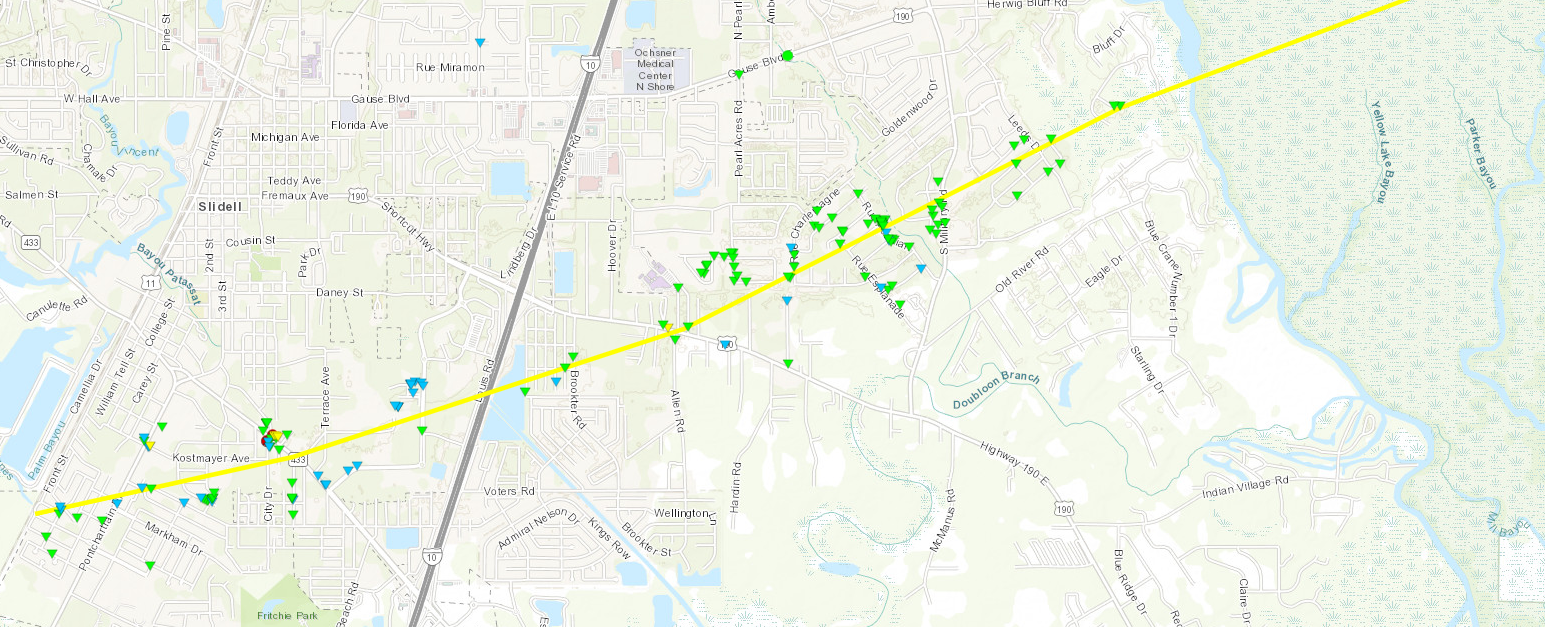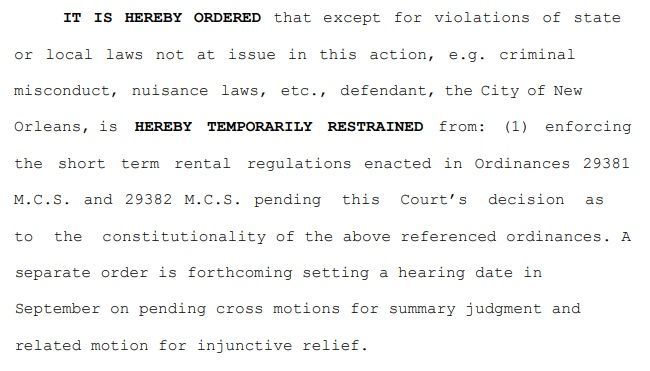Blog
Blog
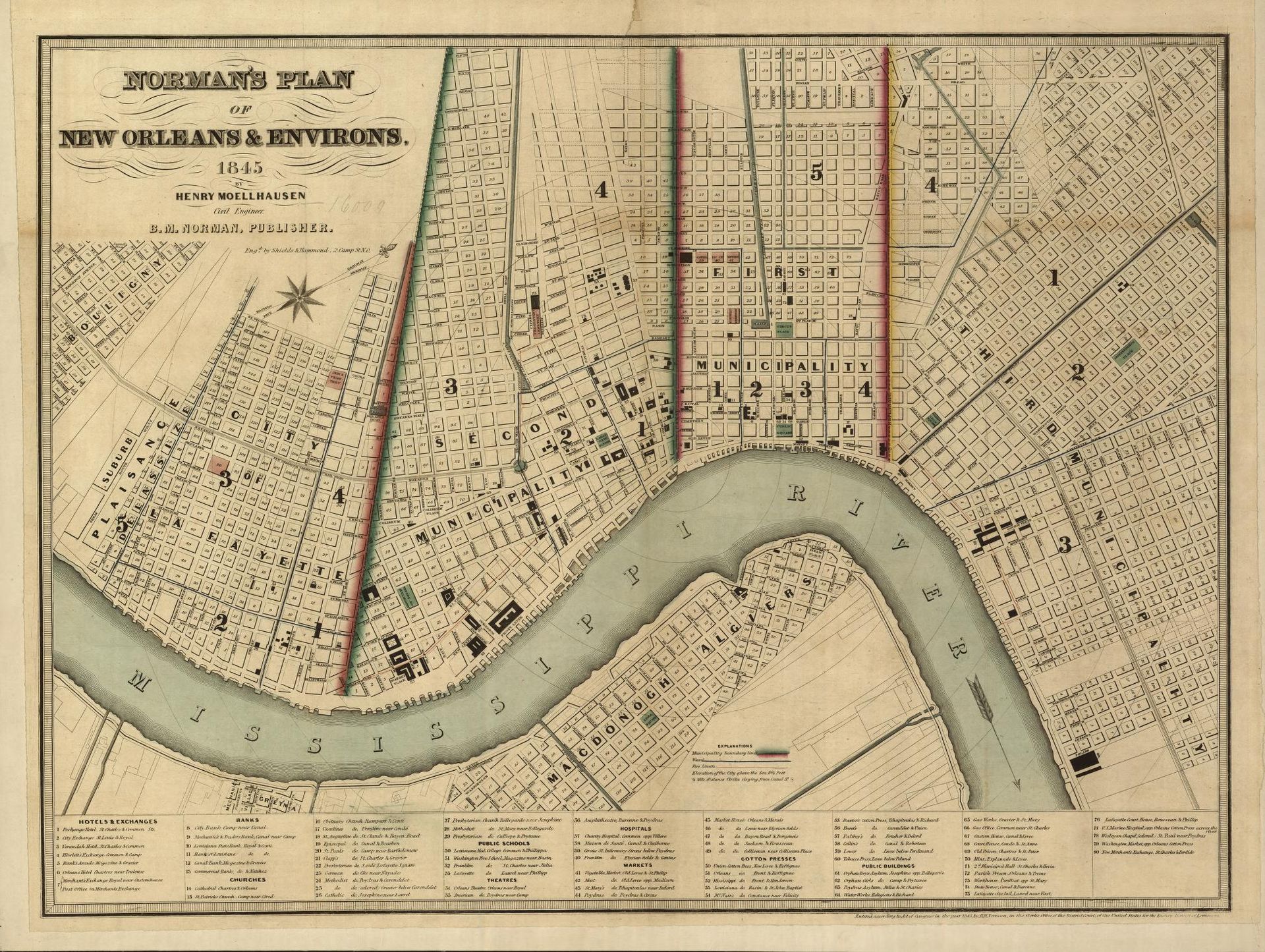
By Chris Stow
•
04 Mar, 2024
Q: How can I get a short term rental permit in New Orleans? A: Until recently, this was a very complicated question. In 2023, the New Orleans City Council implemented new rules about non-commercial short term rentals (NSTRs). However, shortly thereafter, a federal lawsuit in the Eastern District of Louisiana halted the permit process. Since late summer 2023, a court-ordered stay has been in place, essentially freezing the issuance of all NSTR permits in the city of New Orleans. On Wednesday, February 27, 2024, the stay was lifted when Judge Ivan Lemelle issued his ruling, which largely preserved the permitting rules put in place by the City Council. You can read more about the stay here . Q: Can you tell me more about the ruling? A: The 55 page ruling discusses each element of the new NSTR laws and finds the vast majority to be constitutional. There is a small change that allows trust beneficiaries and usufructories to obtain an NSTR permit. If you believe this may apply to you, please contact our office to discuss your particular situation. There have been a variety of news articles covering and summarizing the opinion, you can read the Times Picayune’s coverage here . Q: So, now that the Judge has ruled, can I actually apply for a NSTR permit? A: Yes. The City has indicated that both the operator (OSTR) and non-commercial permit (NSTR) applications will be reopened. The OSTR permit application is open now. The NSTR application, for new applicants, will open on June 1, 2024. Q: What about the lottery that was held last summer? A: If you were included in the August 14, 2023, lottery it appears that those results are still valid and will be honored. That means that, if you won the lottery for your square block, you will have the opportunity to pay and be issued a permit. Q: What is a square block? A: Check out the example illustration on our blog, here . Q: Can you explain the lottery process? A: Each square block is assigned a five digit lottery ID number and every individual applicant in the lottery is given a reference code and a corresponding bingo ball number. During the lottery, the square block lottery ID number is announced, the reference codes and corresponding ball numbers are displayed, and the balls are tossed in the cage. Balls are selected in order, with a first place, second place, third place and so on and announced. The lottery is only held for square blocks where there are multiple applicants trying to get a NSTR permit. Q: If I won the lottery for my block, or didn’t have any competition for a permit, what happens next? A: The City “will be approving Round 1 applications by March 8th” according to a recent email. In theory, this means that by March 8, 2024, you will receive an email from noreply@nola.gov approving your license and telling you how to pay for your permit. You will only have 5 calendar days from receiving the approval email to pay for your permit. If you believe that you won the lottery for your block, or did not have any competition in your block, but do not receive an email from the City, you should quickly take action to protect your right to a permit. Q: What happens if the first place lottery winner doesn’t pay within 5 days? A: If the City does not receive payment within the 5 day window, the next person in line via the lottery will have the opportunity to claim the permit for that square block. If you receive an email from the City directing you to pay for your NSTR permit, you should pay as soon as possible to avoid losing out on a permit. Q: If I entered the August 2023 lottery and didn’t win, what are my options? A: If you entered but were not awarded a permit during the 2023 lottery, the City send you an email or letter officially stating that your application was denied. This letter will probably come after the first place lottery winner pays their permit fees. The next step will be the special exception process, where an exception is given for you to operate a Short Term Rental on sites like Airbnb, despite your square block already having one short term rental or a property licensed as a bed and breakfast. The Stow Firm is representing clients seeking an NSTR exception to the one per square block rule and can assist you with your exception application. Q: What if I didn’t, or couldn’t, enter last year’s lottery—can I still get a permit? A: Yes and your opportunity is coming up soon. On June 1, 2024, new NSTR applications will be accepted. After you submit your application, one of three things will happen: 1) you will be denied (either because of problems with your application itself or because your property does not follow the requirements), 2) you will granted a permit (if there are no other applicants in your square block and no NSTR permit has been granted for your square block), or 3) you will be entered into the next lottery to compete for a permit for your square block. Q: Once you apply for a NSTR permit on June 1, are you automatically entered into the July 1, 2024, lottery? A: No, you will only be entered into the lottery if the following things are true: your application meets all the requirements; your square block does not currently have a B&B or permitted NSTR on it; and at least one other applicant in your square block also applied during the June 2024 application window and met the application requirements. If you are interested in applying for the upcoming NSTR application cycle, feel free to contact the Stow Firm for assistance in completing your application and learning if there are other already permitted NSTRs or B&Bs in your square block. Q: Does the court ruling impact non-residential, commercial STRs in New Orleans? A: No, the court ruling and application process described above only applies to non-commercial, residential rentals. New commercial STR permits are currently frozen in New Orleans, though you may renew an existing CSTR permit. You can read more about this issue on our blog, here . Q. How much does a citation for an illegal STR listed on Airbnb Cost in New Orleans? Fines for illegal Airbnb listings and other STR violations are $500 a day, with each day counting as a separate violation. See New Orleans Comprehensive Zoning Ordinance Sec. 26-629 (a) ("Any person who violates this article or the Comprehensive Zoning Ordinance shall be subject to a fine of not less than $500.00 for each offense. Each day that such violation exists shall constitute a separate and distinct offense. Multiple violations may relate to the same guest stay, day, action, situation, or event, and may be noticed and heard in a single administrative hearing.") As of early March 2024, the City is issuing citations for "illegal" STR listings on Airbnb. Property owners who are issued citations are entitled to notice and the opportunity to be heard at a hearing. This post was updated March 25, 2024.
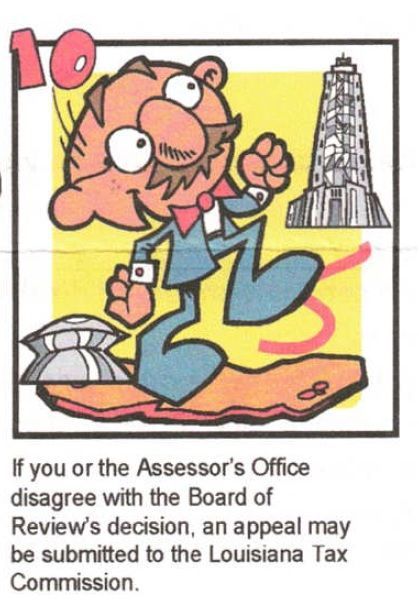
By Chris Stow
•
10 Oct, 2023
Are you among the thousands of New Orleans property owners who saw massive property assessment hikes this summer? The average citywide increase in assessed value was an addition of around 23%. But, according to City Council Vice President Moreno, this assessment season there were “more than 60 thousand[] properties with more than a 50 percent increase” in total assessed value. [1] Though the initial assessments and appeal process generated news coverage, little has been heard since and the vast majority of property owners have not learned what comes next. The Stow Firm has been monitoring the Orleans Parish Tax Appeal process and offers this Q and A to help explain what options property owners still have to reach a fair assessment value. Should you wish to discuss your situation or obtain assistance in filing an appeal to the Louisiana Tax Commission, please reach out to us. Q: When I filed an appeal, what am I actually appealing? A: By filing a property assessment appeal, you are challenging the proposed 2024 assessed value of the building, including land and other improvements. Q: By filing an appeal, am I suing the assessor? A: No, this is different than filing a lawsuit, but the assessor is the opposing party in your appeal. As discussed more below, regardless of the Board of Review’s decision either party (either you or the assessor) can appeal to the Louisiana Tax Commission if unhappy with the result. Q: I filed an appeal before the deadline, but I didn’t hear anything about the outcome. Why? A: If you filed an appeal by the August 18, 2023, deadline, the outcome of that appeal has not yet been officially determined. You may have received information about a short, ten minute Board of Review hearing date when your appeal was scheduled for review by a hearing officer. However, even if you attended your hearing date, you would not know the official outcome. Q: Does the hearing officer decide the appeal? A: No. The outcome of your appeal is officially decided by the New Orleans City Council, which acts as the Board of Review. The Council will base its decision on information you submitted with your appeal, information from the assessor, and information from the hearing officer. Q: Has the City Council already decided my appeal? A: No. The Council will make and adopt an official decision about assessments sometime during its upcoming Board of Review meeting. Q: When is the Board of Review City Council meeting? A: It is currently set on the calendar for October 19, 2023, at 9:15AM. You can check the Council calendar for any updates: https://council.nola.gov/meetings/ Q: How will I be notified of the outcome of my property value assessment appeal? A: According to the City Council, “[b]eginning the Week of October 30, 2023, written notice of appeal determinations sent to appellants and the Assessor by certified mail. The Board's appeal determination will also be available at OrleansTaxAppeal.com.” Q: What if I’m unhappy with the results of my appeal—is the decision final? A: If you disagree with the result of the Board of Review’s decision about your appeal, you have the option to appeal, in writing, to the Louisiana Tax Commission. If you do not appeal to the Tax Commission, then the decision of the Board of Review is final and that valuation will be used to determine your property taxes, even if you believe it is incorrect.

By Chris Stow
•
09 Sep, 2023
How “short” is a short term rental? Short term rentals (STRs) are generally considered to be stays less than 30 days long, though this can vary slightly by locality. In New Orleans, a short term rental is defined, in part, as “the use and enjoyment of a [d]welling [u]nit, or any portion thereof, by guests for a period of less than thirty consecutive days.” This time limit is important because it helps to differentiate short term rentals from more traditional, standard rentals. As all STR owners and operators know, these properties are subject to many, many rules and regulations—including different standards for taxation. STRs usually have to pay a higher rate of taxes than other similar businesses and far more taxes than a traditional rental. What happens if you own a STR and rent it out to someone for 30 days or more? Even though you own a short term rental and may have listed it for rent on a STR website like Airbnb or VRBO, if you are renting to the same person for a stay of 30 consecutive days or more, this is not a short term rental. In New Orleans (and many other places around the country), a 30 day long rental is not taxed at the same rates—or it should not be! Short Term Rental Taxes in New Orleans STR occupancy taxes are usually collected by the booking platform. When someone books a stay, you (as the host) can see exactly how much occupancy tax is being collected and, with a little digging, which taxes are being collected. In New Orleans, for example, Airbnb states that it collects an accommodations tax, general sales and use tax, hotel daily fee, and short term rental tax. Their website provides a bit more information for rentals within New Orleans: New Orleans Sales Tax: 5% of the listing price including any cleaning fee for reservations 59 nights and shorter. New Orleans Hotel Occupancy Privilege Tax: $0.50 per night. STR Occupancy Fee: Nightly fee based on listing type for reservations 29 nights and shorter. STR Equalization Occupancy Tax: 6.75% of the listing price including any cleaning fee for reservations 29 nights and shorter based on listing type. The City of New Orleans, in its outdated STR Handbook, also provides some information about the taxes to be collected (these have been reordered to match the ordering above): City Sales Tax: 5% Occupancy Privilege: (1-299 rooms): $0.50 per night (300+ rooms): $1.00 per night Residential STR Occupancy Fee: $5 per night rented –or— Commercial STR Occupancy Fee: $12 per night rented STR Equalization Occupancy Tax: 6.75% So why are 30 plus day stays still being taxed? Some of these taxes clearly only apply to short term stays, that is, reservations of 29 days or less. However, this doesn’t mean that stays of more than 30 days are charged zero tax. Rather, Airbnb is still charging sales tax for stays up to 60 days long. So, why is Airbnb collecting sales tax for reservations of 30 days or longer? The answer may be in the Louisiana Revised Statutes concerning Sales Tax. These laws explain who owes sales tax when. Generally, hotel guests must pay sales tax on the total of their hotel stay. But, is your STR a “hotel” for the purpose of collecting sales tax from your reservations? In general, the answer is yes. RS 47:301 Sales Tax: Definitions defines hotel as “any establishment or person engaged in the business of furnishing sleeping rooms, cottages, or cabins to transient guests, where such establishment consists of sleeping rooms, cottages, or cabins.” RS 47:301(6)(a). This language is repeated in Orleans Parish Code of Ordinances Sec. 150-441. This clearly includes most if not all STRs. But, what about if you are renting your STR out for 30 days or more? This gets tricky: Under the Louisiana Revised Statutes, “ For purposes of this Chapter, hotel shall not mean or include any establishment or person leasing apartments or single family dwelling on a month-to-month basis.” RS 47:301(6)(a)(iii). Again, Orleans Code of Ordinances Sec. 150-441 repeats this language. However, Orleans Parish Form 8010-STR tax form claims that “Short Term Rental Sales Tax applies only to charges made to transient guests. Whether a guest is transient or permanent must be determined on a case by case basis using the following definitions: Transient guest: one who pays for the room by the day or by the week Permanent guest: one who has a contract and pays for the room by the month and resides in the establishment for at least sixty (60) consecutive calendar days. ” The City provides no support for this definition. What does this all mean for me? This means that even though a booking of more than 30 days does not qualify as a short term rental, the City of New Orleans believes that your guest still has to pay a short term rental sales tax—which is why Airbnb collects taxes in this way. Though remember, sales tax is collected directly from your guest and paid to the City—it isn’t money taken from your payout. Have you been over-taxed? The Stow Firm is currently investigating the legitimacy of this interpretation of the tax laws as well as other discrepancies about how STRs are being taxed. If you believe that you have been over-taxed as a STR host or guest, please contact our office to discuss your case—you probably aren’t alone.
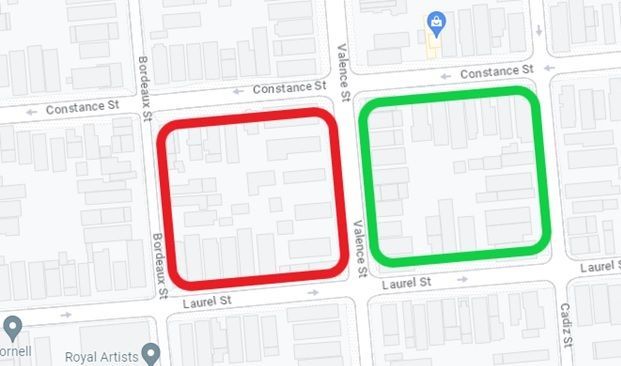
By Chris Stow
•
28 Aug, 2023
Q: Why was there a NSTR Lottery? A: Under the new Non-Commercial Short-Term Rental (NSTR) rules, only one such rental can be permitted within each square block. The lottery system was chosen to award NSTR permits in cases where there was more than one NSTR applicant per square block. Q: What is a square block? A: In the map below, there are two full square blocks shown, one red and one green. Each of the squares is permitted to have one NSTR permit (unless exceptions are granted to allow more). Because of the square system, there could be two NSTRs on opposite sides of the street from one another, but not on the same side of the block.
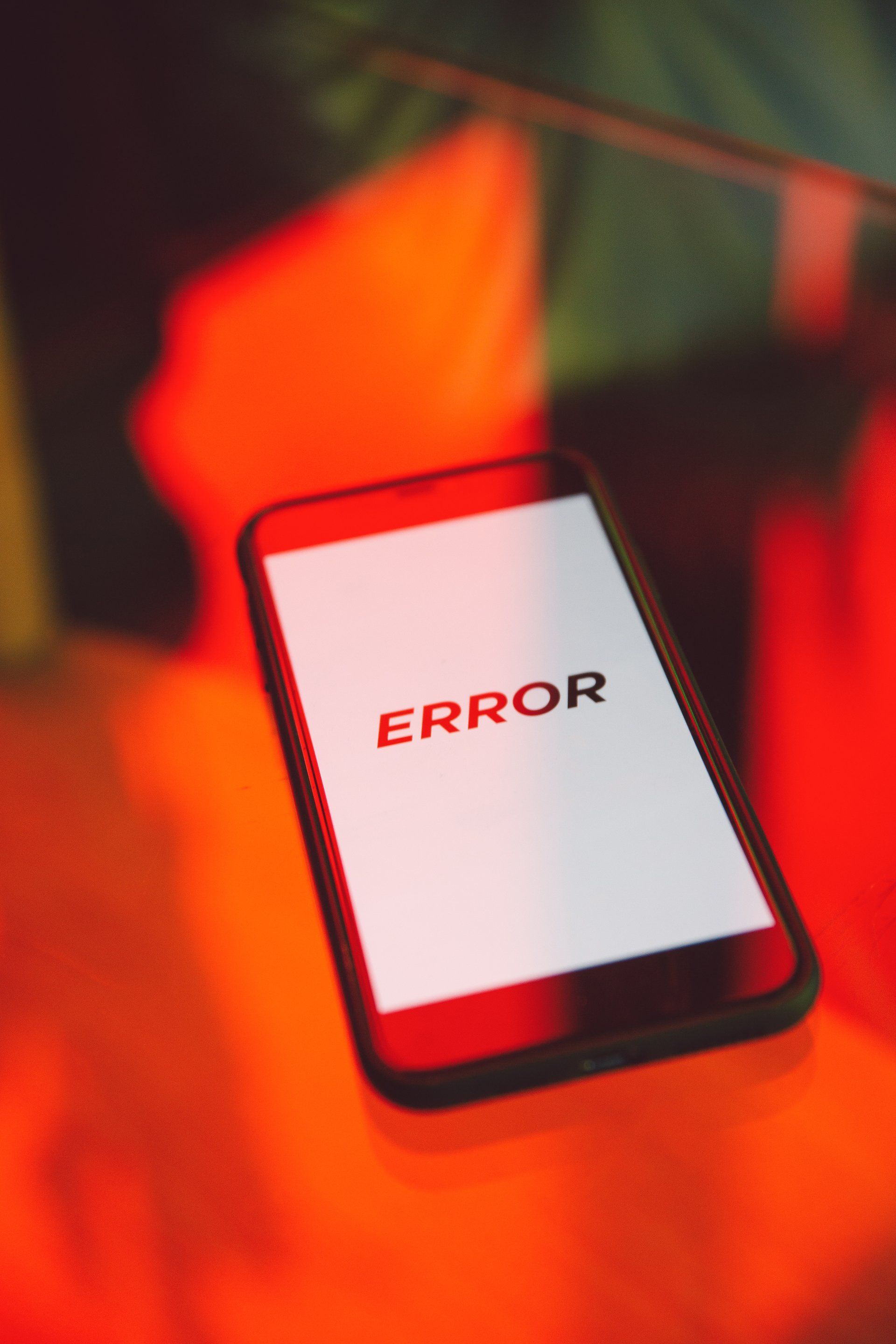
By Chris Stow
•
29 Jun, 2023
Background: Under the new rules to obtain a Short Term Rental permit in non-commercial zones (“NSTR permit”), owners and operators are required to take a class provided by the New Orleans Short Term Rental Administration. This class lasts for about two hours and focuses on what owners and operators must do to successfully complete the application. While classes have been offered in the past, the last online class is scheduled for this morning, Thursday, June 29, 2023, at 11 a.m. C.T. Breaking: The Short Term Rental Administration has mistakenly cancelled the link to the last online training and replaced it with a new one. No details were provided about how the previous link was cancelled or when it was cancelled. As of this writing—less than twelve hours before the final class is scheduled to begin— the new, correct link has not been posted on the City’s Short Term Rental Administration’s website.
